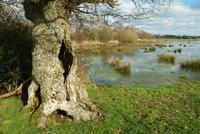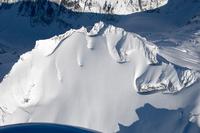-
Simulations help in studying earthquake dampers for structures
Researchers have demonstrated the reliability and efficiency of “real-time hybrid simulation” for testing a type of powerful damping system that might be installed in buildings and bridges to reduce structural damage and injuries during earthquakes. The magnetorheological-fluid dampers are shock-absorbing devices containing a liquid that becomes far more viscous when a magnetic field is applied.
-
-
Raw cotton offers new, ecologically friendly way to clean up oil spills

The Deepwater Horizon disaster highlighted the need for better ways of cleaning up oil spills. A new solution addresses this need. It is based on the finding that unprocessed, raw cotton may be an ideal, ecologically friendly answer, with an amazing ability to sop up oil.
-
-
Cost of Arctic methane release could be “size of global economy”: experts
As the Arctic warms and sea ice melts at an unprecedented rate, hitting a record low last summer, the thawing of offshore “permafrost” in the region is releasing methane, a powerful greenhouse gas. Economic modeling shows that the possible methane emissions caused by shrinking sea ice from just one area of the Arctic, the East Siberian Sea, could come with a global price tag of $60 trillion — the size of the world economy in 2012.
-
-
U.K. winter flooding to get more severe, frequent

Winter flooding in the United Kingdom is set to get more severe and more frequent under the influence of climate change as a result of a change in the characteristics of atmospheric rivers (ARs). ARs are narrow regions of intense moisture flows in the lower troposphere of the atmosphere that deliver sustained and heavy rainfall to mid-latitude regions such as the United Kingdom.
-
-
Nuclear academics, professionals meet for 6th annual ATR NSUF Users Week
The sixth annual Advanced Test Reactor National Scientific User Facility (ATR NSUF) Users Week was held 10-14 June at University Place, the satellite campus for Idaho State University and University of Idaho in Idaho Falls. This nuclear research-themed week was the user facility’s opportunity to update the user community on nuclear energy issues and tools, conduct a research forum where users can come and present their research, run specialized workshops, and build collaboration among academic, industry and government institutions.
-
-
Analysts: arrogance, clumsiness of oil and gas industry caused fracking’s bad image
Oil and gas industry experts say arrogance, secrecy, and poor communication by the drilling industry have led to public anger over hydraulic fracturing, or fracking. These experts are calling for fracking companies to release more information to alleviate public concerns about the relationship between the drilling technology and water contamination.
-
-
Well water contaminants highest near natural gas drilling: study
A new study of 100 private water wells in and near the Barnett Shale showed elevated levels of potential contaminants such as arsenic and selenium closest to natural gas extraction sites. Researchers believe the increased presence of metals could be due to a variety of factors including: industrial accidents such as faulty gas well casings; mechanical vibrations from natural gas drilling activity disturbing particles in neglected water well equipment; or the lowering of water tables through drought or the removal of water used for the hydraulic fracturing process. Any of these scenarios could release dangerous compounds into shallow groundwater.
-
-
The arithmetic of gun control and gun violence
The most comprehensive statistical study of gun violence in the United States – examining data going back to the First World War – finds that, in more common domestic and one-on-one crimes, reduced legal gun availability, if properly enforced, is likelier to lower deaths. In rare mass shootings, armed citizens might save lives if sufficiently trained to avoid accidentally shooting fleeing bystanders. The authors note, though, that key parts of their equations should be studied more closely: the fraction of offenders who illegally possess a gun, the statistical degree of protection provided by legal gun ownership, and the number of people who are legally carrying a gun when attacked. Comprehensive data in those areas, they say, could further aid the development and implementation of effective policies.
-
-
Research priorities for understanding public health aspects of gun-related violence
A new report from the Institute of Medicine (IOM) and National Research Council (NRC) proposes priorities for a research agenda to improve understanding of the public health aspects of gun-related violence. The committee which wrote the report said significant progress can be achieved in three to five years through a research program that addresses five high-priority areas: the characteristics of gun violence, risk and protective factors, prevention and other interventions, gun safety technology, and the influence of video games and other media.
-
-
New technology enables crops to take nitrogen directly from the air
Nitrogen fixation, the process by which nitrogen is converted to ammonia, is vital for plants to survive and grow. Only a very small number of plants, however, most notably legumes (such as peas, beans, and lentils) have the ability to fix nitrogen from the atmosphere with the help of nitrogen fixing bacteria. The vast majority of plants have to obtain nitrogen from the soil, and for most crops currently being grown across the world, this also means a reliance on synthetic nitrogen fertilizer. Nitrogen pollution is a major problem however, and efforts to deal with it are costly. Researchers have developed a method of putting nitrogen-fixing bacteria into the cells of plant roots. The implications for food production are enormous.
-
-
Warming to reduce snow water storage 56 percent in Oregon watershed

A new report projects that by the middle of this century there will be an average 56 percent drop in the amount of water stored in peak snowpack in the McKenzie River watershed of the Oregon Cascade Range — and that similar impacts may be found on low-elevation maritime snow packs around the world. The snowpack reduction may have significant impacts on ecosystems, agriculture, hydropower, industry, municipalities, and recreation, especially in summer when water demands peak.
-
-
La. flood protection agency sues 97 energy companies for wetland destruction
A Louisiana state agency on Wednesday filed a lawsuit against ninety-seven energy companies, charging that the companies have inflicted severe damage on fragile coastal wetlands, damage which left New Orleans and other Louisiana cities more vulnerable to hurricanes and storm surges. The agency wants the court to order these companies to pay steep penalties which would help the state restore the wetlands and thus recreate the natural buffer which had protected New Orleans.
-
-
Humanoid robot ready for DARPA’s Robotics Challenge trials
A Korean research institution joins with nine U.S. universities to enter the team’s DRC-HUBO, a humanoid robot, in DARPA Robotics Challenge (DRC). The competing robots will have to fulfill eight tasks at the competition, among them driving a utility vehicle, walking across rough terrain, climbing a ladder, and using hand tools.
-
-
Overconfident, introverted people more likely to be e-mail phishing victims
New study shows that people who are overconfident, introverted, or women are less able accurately to distinguish between legitimate and phishing e-mails. Phishing is the use of fraudulent e-mail correspondence to obtain passwords and credit card information, or to send viruses.
-
-
Harnessing energy from wind whipping through urban concrete canyons
Two Drexel University students developed a wind-harvesting concept which would exploit the wind whipping through “concrete canyons” between buildings and skyscrapers in large urban centers. Their concept involves a system of wind turbines that could be installed in streets and spaces between buildings, using flexible sails to divert otherwise turbulent winds into a more useful stream.
-
More headlines
The long view
New Technology is Keeping the Skies Safe
DHS S&T Baggage, Cargo, and People Screening (BCP) Program develops state-of-the-art screening solutions to help secure airspace, communities, and borders
Factories First: Winning the Drone War Before It Starts
Wars are won by factories before they are won on the battlefield,Martin C. Feldmann writes, noting that the United States lacks the manufacturing depth for the coming drone age. Rectifying this situation “will take far more than procurement tweaks,” Feldmann writes. “It demands a national-level, wartime-scale industrial mobilization.”
How Artificial General Intelligence Could Affect the Rise and Fall of Nations
Visions for potential AGI futures: A new report from RAND aims to stimulate thinking among policymakers about possible impacts of the development of artificial general intelligence (AGI) on geopolitics and the world order.
Smaller Nuclear Reactors Spark Renewed Interest in a Once-Shunned Energy Source
In the past two years, half the states have taken action to promote nuclear power, from creating nuclear task forces to integrating nuclear into long-term energy plans.
Keeping the Lights on with Nuclear Waste: Radiochemistry Transforms Nuclear Waste into Strategic Materials
How UNLV radiochemistry is pioneering the future of energy in the Southwest by salvaging strategic materials from nuclear dumps –and making it safe.
Model Predicts Long-Term Effects of Nuclear Waste on Underground Disposal Systems
The simulations matched results from an underground lab experiment in Switzerland, suggesting modeling could be used to validate the safety of nuclear disposal sites.
